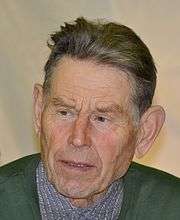Pentti Linkola
| Pentti Linkola | |
|---|---|
 Pentti Linkola in 2011 | |
| Born |
Kaarlo Pentti Linkola 7 December 1932 Helsinki, Finland |
| Period | 1955– |
| Subject | Nature, Ornithology, environmentalism, deep ecology |
| Notable awards |
Eino Leino Prize 1983 |
Kaarlo Pentti Linkola (born 7 December 1932) is a radical Finnish deep ecologist,[1] ornithologist,[2] polemicist, naturalist, writer and fisherman. He has written widely about his ideas and in Finland is a prominent, and highly controversial, thinker.[3][4] Linkola was a year-round fisherman from 1959 to 1995. He has fished on Keitele, Päijänne and Gulf of Finland, and since 1978 he fishes on Vanajavesi.
Linkola blames humans for the continuous degradation of the environment. He promotes rapid population decline in order to combat the problems commonly attributed to overpopulation.[3]
Life
Linkola grew up in Helsinki, spending the summers in the countryside, at the farm of his grandfather Hugo Suolahti. His father Kaarlo Linkola was a botanist and phytogeographer and the Rector of Helsinki University, and his grandfather had worked as the Chancellor of that same university. Pentti Linkola chose not to continue his zoological and botanical studies after his first year.
Linkola is considered one of Finland's most famous ornithologists, but gave up his research career to live an austere life as a fisherman.[2]
Ideas
Linkola believes that democracy is a mistake and only radical change can prevent ecological collapse.[2] He contends that the human populations of the world, regardless if they are developed or underdeveloped, do not deserve to survive at the expense of the biosphere as a whole.[5] In May 1994, Linkola was featured on the front page of The Wall Street Journal Europe.[6] He said he was for a radical reduction in the world population and was quoted as saying about a future world war, "If there were a button I could press, I would sacrifice myself without hesitating, if it meant millions of people would die."[7]
Linkola's writings describe in emotional detail the environmental degradation he has witnessed. He dedicated his 1979 Toisinajattelijan päiväkirjasta (From the Diary of a Dissident) to Andreas Baader and Ulrike Meinhof, stating that "they are the signposts, not Jesus of Nazareth or Albert Schweitzer."[2]
Paul G. Harris, Chair Professor of Global and Environmental Studies at the Education University of Hong Kong, contends that while most environmentalists in Finland have distanced themselves from Linkola, those concerned about the environment avidly read his writings. Harris asserts that Linkola represents "a very Finnish and dark version of "an inconvenient truth.""[2]
In 1995, Linkola founded the Finnish Nature Heritage Foundation (Luonnonperintösäätiö). It concentrates on preserving the few ancient forests still left in southern Finland and other nature conservation. The forests are donated to the foundation.
See also
Bibliography
- Linkola, Pentti & Olavi Hilden: Suuri Lintukirja. Otava 1955, renewed edition 1962.
- Linkola, Pentti: Isänmaan ja ihmisen puolesta: Mutta ei ketään vastaan. Fourth edition. Helsinki: Suomen sadankomitealiitto, 1981 (originally published 1960).
- Linkola, Pentti: Pohjolan linnut värikuvin: Elinympäristö. Levinneisyys. Muutto. Otava 1963–67.
- Linkola, Pentti: Unelmat paremmasta maailmasta. Fourth edition. Porvoo: WSOY, 1990.
- Linkola, Pentti: Toisinajattelijan päiväkirjasta. Porvoo: WSOY, 1979.
- In 1983 Linkola received the Eino Leino Prize for the book.[8]
- Linkola, Pentti & Osmo Soininvaara: Kirjeitä Linkolan ohjelmasta. Porvoo: WSOY, 1986.
- Linkola, Pentti: Johdatus 1990-luvun ajatteluun. Porvoo: WSOY, 1989.
- Vilkka, Leena (ed.): Ekologiseen elämäntapaan: lead article. Helsinki: Yliopistopaino, 1996.
- Linkola, Pentti: Voisiko elämä voittaa. Helsinki: Tammi, 2004.
- Linkola, Pentti: Can Life Prevail?: A Revolutionary Approach to the Environmental Crisis. UK: Arktos Media, 2nd Revised ed. 2011. ISBN 1907166637 (English translation of Voisiko elämä voittaa).
Also:
References
- ↑ Mika LaVaque-Manty, "Arguments and fists: political agency and justification in liberal theory", Routledge, 2002, p. 159
- 1 2 3 4 5 Harris, Paul G. (2009). Environmental Change and Foreign Policy: Theory and Practice. Routledge. p. 125. ISBN 9781134014811.
- 1 2 George C. Schoolfield, "A history of Finland's literature", U of Nebraska Press, 1998, p. 271
- ↑ Henry Minde, Svein Jentoft, Harald Gaski, "Indigenous peoples: self-determination, knowledge, indigeneity", Eburon Uitgeverij B.V., 2008, p. 100
- ↑ Humanflood by Pentti Linkola. Translated by Harri Heinonen and Michael Moynihan. Originally published in Apocalypse Culture II, ed. Adam Parfrey (Feral House, 2000). pp. 436–451. ISBN 0922915571
- ↑ Neuhaus, Richard John (1997). The best of The Public square: selections from Richard John Neuhaus' celebrated column in First things. Institute on Religion and Public Life. p. 61. ISBN 0-9659507-0-0.
- ↑ Milbank, Dana (24 May 1994). "A Strange Finnish Thinker Posits War, Famine as Ultimate 'Goods'". The Wall Street Journal Asia. p. 1.
- ↑ "Eino Leinon palkinto" (in Finnish). The Finnish Book Foundation. Archived from the original on 23 October 2014. Retrieved 30 January 2015.
External links

